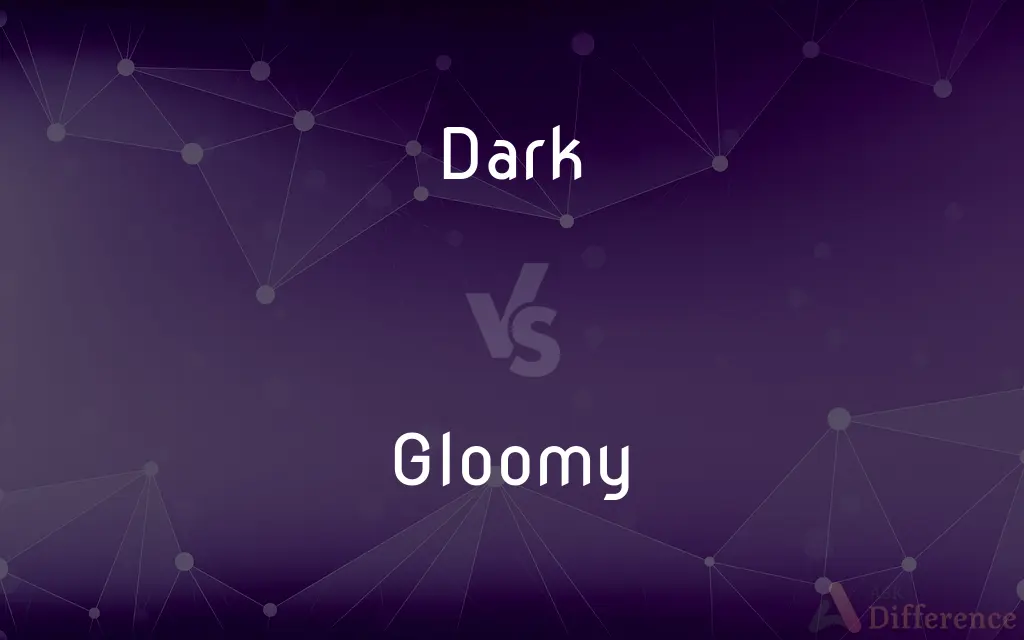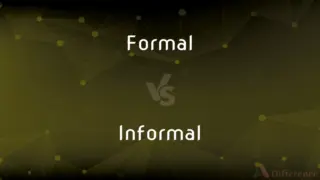Dark vs. Gloomy — What's the Difference?
Edited by Tayyaba Rehman — By Urooj Arif — Updated on March 20, 2024
Dark describes the absence of light, while gloomy implies a dimness with a mood of despair.

Difference Between Dark and Gloomy
Table of Contents
ADVERTISEMENT
Key Differences
Darkness is a condition characterized by a lack of light, making it difficult to see, and it is often associated with nighttime or poorly lit spaces. On the other hand, gloominess not only involves low light levels but also carries connotations of sadness, depression, or a foreboding atmosphere. This emotional component distinguishes gloomy from merely dark.
While "dark" can refer to a physical state with no moral or emotional value attached, "gloomy" often suggests an emotional or atmospheric quality that can affect one's mood or perception of a place. For example, a dark room simply lacks light, whereas a gloomy room may be dimly lit but also feels oppressive or melancholic.
Darkness is often used in a literal sense to describe the absence of light, such as in a dark night or a dark room. In contrast, gloominess can be used both literally, to describe dim and shadowy light conditions, and metaphorically, to describe feelings of despair or hopelessness, as in a gloomy outlook on life.
In literature and art, darkness is frequently used to set a scene or create a specific tone, often associated with mystery, the unknown, or fear. Gloomy settings, however, are used to evoke a sense of desolation, sadness, or foreboding, adding an emotional layer to the physical setting.
The concept of darkness can be neutral or negative depending on the context; it is not inherently negative. However, gloominess almost always carries a negative connotation, suggesting an unwanted or unpleasant state, whether it's the lighting of an environment or a person's emotional state.
ADVERTISEMENT
Comparison Chart
Definition
Absence of light
Dimness with despair
Connotation
Neutral or negative
Negative
Usage
Literal absence of light
Emotional or atmospheric quality
Emotional Impact
Neutral or fear-inducing
Sadness, despair
In Literature/Art
Mystery, the unknown
Desolation, foreboding
Compare with Definitions
Dark
Characterized by a lack of light.
The basement remained dark even at noon.
Gloomy
Dimly lit, often with a sense of despair or depression.
The overcast sky made the afternoon gloomy.
Dark
Often refers to the time when the sun is down.
The countryside is particularly dark on moonless nights.
Gloomy
Implies a mood of sadness or hopelessness.
The news cast a gloomy mood over the evening.
Dark
Can be simply a factual statement about lighting.
The room became dark as the bulbs flickered out.
Gloomy
Evokes a sense of desolation or melancholy.
The novel's gloomy setting reflected the protagonist's despair.
Dark
Used to create suspense or fear.
The dark forest was rumored to be haunted.
Gloomy
Often used to describe overcast or stormy conditions.
The gloomy weather matched his somber mood.
Dark
Makes it difficult to see.
The path was dark and treacherous at night.
Gloomy
Can negatively affect one's emotional state.
The gloomy room felt oppressive and unwelcoming.
Dark
Lacking or having very little light
A dark corner.
Gloomy
Partially or totally dark, especially dismal and dreary
A damp, gloomy day.
Dark
Lacking brightness
A dark day.
Gloomy
Showing or filled with gloom
Gloomy faces.
Dark
Reflecting only a small fraction of incident light; tending toward black
Dark clothing.
Gloomy
Causing or producing gloom; depressing
Gloomy news.
Dark
Served without milk or cream
Dark coffee.
Gloomy
Marked by hopelessness; very pessimistic
Gloomy predictions.
Dark
Being or having a complexion that is not light in color.
Gloomy
Not very illuminated; dim because of darkness, especially when appearing depressing or frightening.
The cavern was gloomy.
Dark
Sullen or threatening
A dark scowl.
Gloomy
Suffering from gloom; melancholy; dejected.
A gloomy temper or countenance
Dark
Characterized by gloom or pessimism; dismal or bleak
A dark day for the economy.
Dark predictions of what lies in store.
Gloomy
(informal) Someone or something that is gloomy or pessimistic.
Dark
Being or characterized by morbid or grimly satiric humor.
Gloomy
Imperfectly illuminated; dismal through obscurity or darkness; dusky; dim; clouded; as, the cavern was gloomy.
Dark
Unknown or concealed; mysterious
A dark secret.
The dark workings of the unconscious.
Gloomy
Affected with, or expressing, gloom; melancholy; dejected; as, a gloomy temper or countenance.
Dark
Lacking enlightenment, knowledge, or culture
A dark age in the history of education.
Gloomy
Characterized by hopelessness; filled with gloom;
Gloomy at the thought of what he had to face
Gloomy predictions
A gloomy silence
Took a grim view of the economy
The darkening mood
Dark
Evil in nature or effect; sinister
"churned up dark undercurrents of ethnic and religious hostility" (Peter Maas).
Gloomy
Depressing in character or appearance;
Drove through dingy streets
The dismal prison twilight
Drab old buildings
A dreary mining town
Gloomy tenements
Sorry routine that follows on the heels of death
Dark
Morally corrupt; vicious
Dark deeds.
A dark past.
Gloomy
Depressingly dark;
The gloomy forest
The glooming interior of an old inn
`gloomful' is archaic
Dark
Having richness or depth
A dark, melancholy vocal tone.
Gloomy
Causing or suggestive of sorrow or gloom;
A gloomy outlook
Gloomy news
Dark
Not giving performances; closed
The movie theater is dark on Mondays.
Gloomy
Reflecting gloom;
Gloomy faces
Dark
(Linguistics) Pronounced with the back of the tongue raised toward the velum. Used of the sound (l) in words like full.
Gloomy
Causing dejection;
A blue day
The dark days of the war
A week of rainy depressing weather
A disconsolate winter landscape
The first dismal dispiriting days of November
A dark gloomy day
Grim rainy weather
Dark
Absence of light.
Dark
A place having little or no light.
Dark
Night; nightfall
Home before dark.
Dark
A deep hue or color.
Dark
Darks Pieces of laundry having a dark color.
Dark
Having an absolute or (more often) relative lack of light.
The room was too dark for reading.
Dark
(of a source of light) Extinguished.
Dark signals should be treated as all-way stop signs.
Dark
Deprived of sight; blind.
Dark
Transmitting, reflecting, or receiving inadequate light to render timely discernment or comprehension: caliginous, darkling, dim, gloomy, lightless, sombre.
Dark
(of colour) Dull or deeper in hue; not bright or light.
My sister's hair is darker than mine;
Her skin grew dark with a suntan
Dark
Ambiguously or unclearly expressed: enigmatic, esoteric, mysterious, obscure, undefined.
Dark
Marked by or conducted with secrecy: hidden, secret; clandestine, surreptitious.
Dark
Without moral or spiritual light; sinister, malign.
A dark villain;
A dark deed
Dark
Conducive to hopelessness; depressing or bleak.
The Great Depression was a dark time;
The film was a dark psychological thriller
Dark
(of a time period) Lacking progress in science or the arts.
Dark
Extremely sad, depressing, or somber, typically due to, or marked by, a tragic or undesirable event.
September 11, 2001, the day when four terrorist attacks destroyed the Twin Towers and the Pentagon, is often referred to as America's dark day.
Dark
With emphasis placed on the unpleasant aspects of life; said of a work of fiction, a work of nonfiction presented in narrative form, or a portion of either.
The ending of this book is rather dark.
Dark
Off the air; not transmitting.
Dark
A complete or (more often) partial absence of light.
Dark surrounds us completely.
Dark
(uncountable) Ignorance.
We kept him in the dark.
The lawyer was left in the dark as to why the jury was dismissed.
Dark
(uncountable) Nightfall.
It was after dark before we got to playing baseball.
Dark
A dark shade or dark passage in a painting, engraving, etc.
Dark
(intransitive) To grow or become dark, darken.
Dark
(intransitive) To remain in the dark, lurk, lie hidden or concealed.
Dark
(transitive) To make dark, darken; to obscure.
Dark
Destitute, or partially destitute, of light; not receiving, reflecting, or radiating light; wholly or partially black, or of some deep shade of color; not light-colored; as, a dark room; a dark day; dark cloth; dark paint; a dark complexion.
O dark, dark, dark, amid the blaze of noon,Irrecoverably dark, total eclipseWithout all hope of day!
In the dark and silent grave.
Dark
Not clear to the understanding; not easily seen through; obscure; mysterious; hidden.
The dark problems of existence.
What may seem dark at the first, will afterward be found more plain.
What's your dark meaning, mouse, of this light word?
Dark
Destitute of knowledge and culture; in moral or intellectual darkness; unrefined; ignorant.
The age wherein he lived was dark, but heCould not want light who taught the world to see.
The tenth century used to be reckoned by mediæval historians as the darkest part of this intellectual night.
Dark
Evincing black or foul traits of character; vile; wicked; atrocious; as, a dark villain; a dark deed.
Left him at large to his own dark designs.
Dark
Foreboding evil; gloomy; jealous; suspicious.
More dark and dark our woes.
A deep melancholy took possesion of him, and gave a dark tinge to all his views of human nature.
There is, in every true woman-s heart, a spark of heavenly fire, which beams and blazes in the dark hour of adversity.
Dark
Deprived of sight; blind.
He was, I think, at this time quite dark, and so had been for some years.
Dark
Absence of light; darkness; obscurity; a place where there is little or no light.
Here stood he in the dark, his sharp sword out.
Dark
The condition of ignorance; gloom; secrecy.
Look, what you do, you do it still i' th' dark.
Till we perceive by our own understandings, we are as much in the dark, and as void of knowledge, as before.
Dark
A dark shade or dark passage in a painting, engraving, or the like; as, the light and darks are well contrasted.
The lights may serve for a repose to the darks, and the darks to the lights.
Dark
To darken; to obscure.
Dark
Absence of light or illumination
Dark
Absence of moral or spiritual values;
The powers of darkness
Dark
An unilluminated area;
He moved off into the darkness
Dark
The time after sunset and before sunrise while it is dark outside
Dark
An unenlightened state;
He was in the dark concerning their intentions
His lectures dispelled the darkness
Dark
Devoid or partially devoid of light or brightness; shadowed or black or somber-colored;
Sitting in a dark corner
A dark day
Dark shadows
The theater is dark on Mondays
Dark as the inside of a black cat
Dark
(used of color) having a dark hue;
Dark green
Dark glasses
Dark colors like wine red or navy blue
Dark
Brunet (used of hair or skin or eyes);
Dark eyes
Dark
Stemming from evil characteristics or forces; wicked or dishonorable;
Black deeds
A black lie
His black heart has concocted yet another black deed
Darth Vader of the dark side
A dark purpose
Dark undercurrents of ethnic hostility
The scheme of some sinister intelligence bent on punishing him
Dark
Causing dejection;
A blue day
The dark days of the war
A week of rainy depressing weather
A disconsolate winter landscape
The first dismal dispiriting days of November
A dark gloomy day
Grim rainy weather
Dark
Secret;
Keep it dark
The dark mysteries of Africa and the fabled wonders of the East
Dark
Showing a brooding ill humor;
A dark scowl
The proverbially dour New England Puritan
A glum, hopeless shrug
He sat in moody silence
A morose and unsociable manner
A saturnine, almost misanthropic young genius
A sour temper
A sullen crowd
Dark
Lacking enlightenment or knowledge or culture;
This benighted country
Benighted ages of barbarism and superstition
The dark ages
A dark age in the history of education
Dark
Marked by difficulty of style or expression;
Much that was dark is now quite clear to me
Those who do not appreciate Kafka's work say his style is obscure
Dark
Having skin rich in melanin pigments;
National Association for the Advancement of Colored People
The dark races
Dark-skinned peoples
Dark
Not giving performances; closed;
The theater is dark on Mondays
Common Curiosities
What is the primary difference between dark and gloomy?
The primary difference is that dark refers to the absence of light, while gloomy implies dimness with a negative emotional or atmospheric connotation.
Can a place be dark without being gloomy?
Yes, a place can be dark without being gloomy if it simply lacks light without inducing feelings of sadness or despair.
Is gloominess always related to light conditions?
Not always; gloominess can also refer to an emotional state or outlook, independent of physical light conditions.
Are there any benefits to experiencing darkness or gloominess?
Experiencing darkness can help regulate circadian rhythms and promote rest, while occasional gloominess might foster empathy, creativity, or a deeper appreciation for happier times.
Can a sunny day be described as gloomy?
While unusual, a sunny day might be described as gloomy if there are elements that contribute to a mood of despair or sadness, such as in the context of a tragic event.
How do dark and gloomy settings affect mood in literature?
Dark settings can evoke fear, mystery, or suspense, while gloomy settings tend to evoke sadness, desolation, or melancholy.
How do artists use darkness in their work?
Artists use darkness to create contrast, focus attention, evoke emotions like fear or mystery, and set a tone or mood.
Can gloominess have any positive connotations?
Gloominess is typically negative, but in some contexts, it might evoke a sense of coziness or introspection, especially in literature or film.
How do dark and gloomy environments affect human psychology?
Dark environments can cause discomfort or fear due to reduced visibility, while gloomy environments can lead to feelings of sadness or oppression.
Can the use of the term "gloomy" be subjective?
Yes, what one person perceives as gloomy, another might not, depending on individual associations, experiences, and current mood.
Share Your Discovery

Previous Comparison
Collar vs. Choker
Next Comparison
Formal vs. InformalAuthor Spotlight
Written by
Urooj ArifUrooj is a skilled content writer at Ask Difference, known for her exceptional ability to simplify complex topics into engaging and informative content. With a passion for research and a flair for clear, concise writing, she consistently delivers articles that resonate with our diverse audience.
Edited by
Tayyaba RehmanTayyaba Rehman is a distinguished writer, currently serving as a primary contributor to askdifference.com. As a researcher in semantics and etymology, Tayyaba's passion for the complexity of languages and their distinctions has found a perfect home on the platform. Tayyaba delves into the intricacies of language, distinguishing between commonly confused words and phrases, thereby providing clarity for readers worldwide.
















































